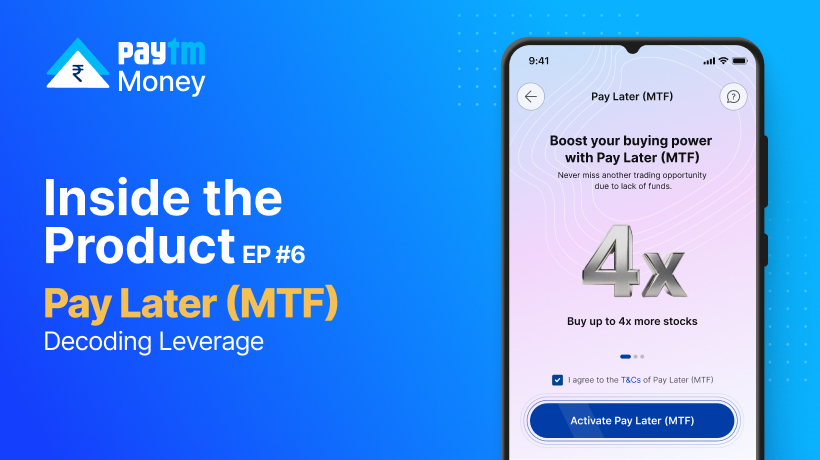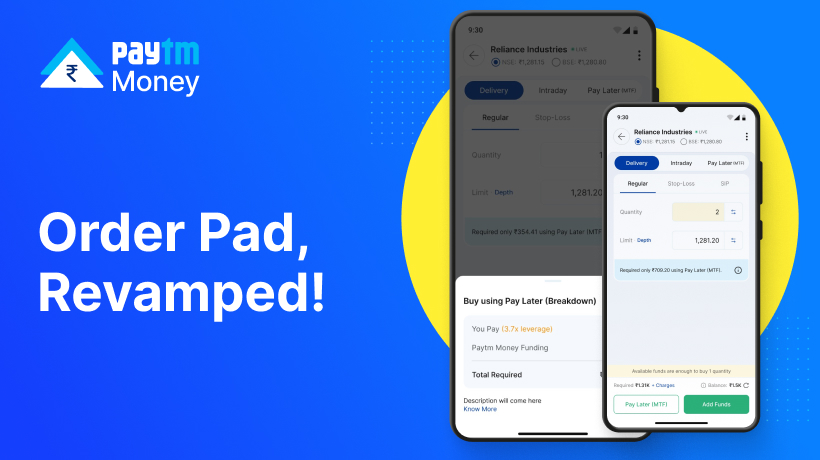What is Margin Pledge? 3 min read
Hello customer! Today we’ll be talking about a new feature on Paytm Money known as Margin Pledge. Now it may sound complicated, but trust me, it is not. It is a rather simple concept with a lot of benefits. Let’s understand what it is.
What do you mean by Margin Pledge and how does it work?
You may have stocks lying in your portfolio, but will have limited cash margins, due to which you might lose out on some attractive trading opportunities. In such a scenario, margin pledge comes in handy.
Margin Pledge is a process in which you can pledge their stocks to the broker in return for a collateral margin, which you receive after percentage deduction called a haircut.
Let’s understand this better via an example; suppose I am an investor who has shares of RIL, TCS and Infosys worth Rs 2,00,000 in his holding. Now a trading opportunity arises but due to lack of funds, I am unable to seize it. So, I decided to pledge my stocks to the broker. He then deducts a % haircut (Haircut is the amount that covers for the risk a broker is exposed to if the collateral share prices move erratically) of say 20% from the total value of my stocks (calculated at their current market price), i.e., Rs 40,000 and gives me the remaining value of Rs 1,60,000 as a collateral margin which I can now use for trading opportunities.
The margin received from pledging can be used for selling Options in Intraday/Carry Forward, trading in Futures in Intraday/Carry Forward and trading Cash segment in Intraday.. The collateral received will be calculated on the basis of the lower of Last Traded Price (LTP) or Previous Close of the stock & will be updated in real time after deduction of the haircut. The price of the margin is not fixed, but keeps varying from day to day depending on the closing price of your pledged stocks.
A minimal charge of Rs 15 + GST per ISIN will be imposed on each pledging request. Charges for un-pledging are also the same. For Carry forward Option selling and Future trade, 50% margin needs to be funded by cash. If users consume more than 50% amount from collateral funds then outstanding balance will be charged 1.5% per month interest. Our Risk team will square-off the position whenever total margin falls below the required margin for the position.
| Scenario 1 | Scenario 2 | Scenario 3 | |
| Share pledged value | Rs 5000 | Rs 5000 | Rs 5000 |
| FnO position value | Rs 10000 | Rs 10000 | Rs 10000 |
| Margin required (eg) | Rs 2000 | Rs 2000 | Rs 2000 |
| Cash utilized | Rs 1000 | 0 | Rs 2000 |
| Collateral utilized | Rs 1000 | Rs 2000 | – |
| Interest | No interest charged | Interest rate of 1.5% pm on Rs 1000 | – |
Click to know more about the “Steps to carry out a Margin Pledge on Paytm Money.”
What is Un-pledge and Invocation?
Now that we have understood what pledging is, you must be wondering, can I get back my stocks after pledging? The answer is yes, you can do this through a process called un-pledge. Un-pledge is the act of retrieval of your pledged stocks from the broker.
One thing you should understand here is that even though we might use terms such as a pledge and retrieval, the stocks remain in your DEMAT account throughout the duration of the pledge and you are eligible to receive all the corporate actions like dividends, bonus, etc. in your DEMAT.
Invocation is an act in which the risk team of a broker sells the stock for covering the risk arising out of clients’ stocks that are pledged.
To better understand this, if the market price of the pledged stock plummets, the broker would seek additional margin in terms of more shares, cash, or other form of collateral, and in the event the investor/user is unable to provide for this additional margin, (although highly unlikely) the broker will have to invoke the shares.
The margin pledge facility is a value-added service provided by only a few brokerages and can be an excellent avenue to create wealth for the investor, but one needs to proceed with a certain level of caution.
This blog is published by Aryan Gupta




